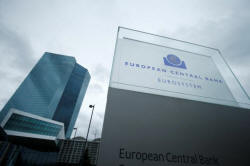Eyeing the easy money exit: Five questions for the ECB
 Send a link to a friend
Send a link to a friend
 [March 06, 2018]
By Dhara Ranasinghe and Ritvik Carvalho [March 06, 2018]
By Dhara Ranasinghe and Ritvik Carvalho
LONDON (Reuters) - As European Central Bank
policymakers get ready to meet on Thursday, market focus turns once more
to just when the central bank will wind up its massive stimulus scheme.
While the ECB is expected to maintain a cautious policy stance,
economists say a robust economic backdrop could make it increasingly
difficult to maintain the so-called easing bias -- a stipulation that
the bank can increase asset purchases if necessary.
Here are some of the main questions on the radar for markets ahead of
Thursday's meeting.
1. Could the ECB drop its easing bias on QE?
Policymakers are likely to discuss dropping their easing bias but a
broader revision of the bank's policy guidance is likely to happen
later, possibly during the summer, sources close to discussions told
Reuters last week.
While no major change is expected at the March 8 meeting, almost a third
of 56 economists polled by Reuters said the central bank could drop its
easing bias on asset purchases.

Analysts said any drop in the bias could strengthen the euro and push up
bond yields, although bigger changes to the ECB's "forward guidance" are
more likely to come in June.
(GRAPHIC: The ECB's QE programme - http://reut.rs/2FiEeks)
2. Does that mean we can expect a "hawkish" ECB meeting?
Hardly. The ECB is likely to avoid any steps that would spark an
unwarranted rise in the single currency or euro area borrowing costs.
That means any drop in the QE easing bias would probably be balanced by
an overall cautious tone.
No major policy shifts are expected on Thursday, sources told Reuters
last week. Recent market turbulence, a strong euro, a dip in inflation
and political deadlock in Italy after weekend elections could encourage
policymakers to strike a cautious tone.
But there is little doubt about the direction of policy and investors
still anticipate an ECB rate rise in early 2019.
(GRAPHIC: Money markets bring forward bets on timing of ECB rate hikes -
http://reut.rs/2D438SS)
3. How does a strong euro feed into the ECB's deliberations?
Since the ECB's Jan. 25 meeting, the pace of the euro's rise has cooled
a bit and the currency has declined nearly 2 percent. But the euro has
not lost any ground when measured on a trade-weighted basis <EUREER=ECBF>
and briefly hit a more than a three-year high above $1.25 <EUR=EBS> last
month.
ECB chief Mario Draghi skirted the question of the strong euro in
January by saying the bank did not target exchange rates, but he may be
confronted on the currency again as economic momentum stalls after a
strong start to 2018.

[to top of second column] |

The European Central Bank (ECB) headquarters are pictured in
Frankfurt, Germany December 14, 2017. REUTERS/Ralph Orlowski

A Citigroup economic surprise index <.CESIEUR> has fallen to its lowest level
since 2016, dropping into negative territory which reflects that economic
releases have on balance come in below consensus forecasts.
(GRAPHIC: Economic surprises in Europe turn negative - http://reut.rs/2FjUVfx)
Any word of caution on the firm euro could spark a washout of long positions in
the markets where bets on further euro strength are near a record.
4. Could the ECB change its inflation forecasts?
The ECB is due to publish its economic forecasts on Thursday but significant
changes to its estimates of future inflation and economic growth are not
expected by economists.
"The combination of slightly higher oil prices, food prices and a stronger
currency is likely to be neutral in terms of inflation projections," said Pictet
Wealth Management economist Frederik Ducrozet.
Euro zone inflation slowed to a 14-month low in February and remains below the
ECB's near 2 percent target. A key market gauge of euro zone inflation
expectations is at 1.70 percent <EUIL5YF5Y=R> and close to its lowest this year,
highlighting that low inflation remains a key obstacle to policy
"normalization."
(GRAPHIC: Inflations drifts further away from ECB target - http://reut.rs/2FiEeAY)
5. How worried is the ECB about a global trade war?
Given that Draghi took a swipe at Washington at his last news conference for
talking down the dollar, investors will listen out to any comment from the ECB
chief about U.S. President Donald Trump's plan to slap steep import tariffs on
steel and aluminum.

Worries about a trade war have rattled world markets, dealing a blow to the
dollar and threatening further upward pressure on euro -- an unwelcome
development for policymakers since the strong euro keeps inflation down and
could complicate the ECB's exit strategy from quantitative easing.
(GRAPHIC: Euro strength - http://reut.rs/2FhIjK0)
(Reporting by Dhara Ranasinghe, Saikat Chaterjee and Fanny Potkin; Graphics by
Ritvik Carvalho; Editing by Catherine Evans)
[© 2018 Thomson Reuters. All rights
reserved.] Copyright 2018 Reuters. All rights reserved. This material may not be published,
broadcast, rewritten or redistributed.
Thompson Reuters is solely responsible for this content. |